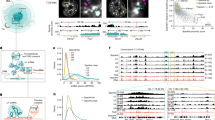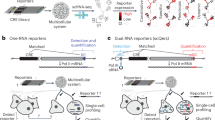Abstract
THE discovery that messenger RNA (mRNA) in mammalian cells contains sequences of polyadenylic acid (poly A) about 200 nucleotides long localized at the 3′-OH terminus of the mRNA molecule1–5 has raised questions about the function of poly A, but has also provided a powerful new tool for the study of mRNA metabolism. I have measured the stability of mRNA in exponentially growing mouse L-cells without having to resort to the use of inhibitors of RNA synthesis, and found that poly A-containing mRNA has a half-life of 10 h, and thus turns over approximately once per cell generation (15 h). This high stability is in striking contrast to the 3–4 h half-life for mRNA in cultured cells obtained by following the decay of polyribosomes after treatment with a high dose of actinomycin D6,7, This, however, agrees with the finding of Cheevers and Sheinin8 that there is a long-lived fraction of mRNA in cells treated with a low dose of actinomycin D. Singer and Penman9 have simultaneously found that poly A-containing mRNA in HeLa cells turns over about once per cell generation.
This is a preview of subscription content, access via your institution
Access options
Subscribe to this journal
Receive 51 print issues and online access
$199.00 per year
only $3.90 per issue
Buy this article
- Purchase on Springer Link
- Instant access to full article PDF
Prices may be subject to local taxes which are calculated during checkout
Similar content being viewed by others
References
Kates, J., Cold Spring Harbor Symp. Quant. Biol., 35, 743 (1970).
Lee, S. Y., Mendecki, J., and Brawerman, G., Proc. US Nat. Acad. Sci., 68, 1331 (1971).
Edmonds, M., Vaughan, jun., M. H., and Nakazoto, H., Proc. US Nat. Acad. Sci., 68, 1336 (1971).
Darnell, J. E., Wall, R., and Tushinski, R. J., Proc. US Nat. Acad. Sci., 68, 1321 (1971).
Perry, R. P., Greenberg, J. R., Kelley, D. E., LaTorre, J., and Schochetman, G., Gene Expression and Its Regulation (Plenum Press).
Penman, S., Scherrer, K., Becker, Y., and Darnell, J. E., Proc. US Nat. Acad. Sci., 49, 654 (1963).
Craig, N., Perry, R. P., and Kelley, D. E., Biochim. Biophys. Acta, 246, 493 (1971).
Cheevers, W. P., and Sheinin, R., Biochim. Biophys. Acta, 204, 449 (1970).
Singer, R. H., and Penman, S., Nature New Biology (in the press).
Rake, A. V., and Graham, A. F., J. Cell. Comp. Physiol., 59, 139 (1962).
Perry, R. P., and Kelley, D. E., J. Mol. Biol., 35, 37 (1968).
Weber, M. J., Nature New Biology, 235, 58 (1972).
Perry, R. P., LaTorre, J., Kelley, D. E., and Greenberg, J. R., Biochim. Biophys. Acta, 262, 220 (1972).
Adesnik, M., and Darnell, J. E., J. Mol. Biol. (in the press).
Borun, T. W., Scharff, M. D., and Robbins, E., Proc. US Nat. Acad. Sci., 58, 1977 (1967).
Gallwitz, D., and Mueller, G. C., J. Biol. Chem., 244, 5947 (1969).
Author information
Authors and Affiliations
Rights and permissions
About this article
Cite this article
GREENBERG, J. High Stability of Messenger RNA in Growing Cultured Cells. Nature 240, 102–104 (1972). https://doi.org/10.1038/240102a0
Received:
Issue Date:
DOI: https://doi.org/10.1038/240102a0
This article is cited by
-
Role of Everlasting Triplet Expansions in Protein Evolution
Journal of Molecular Evolution (2011)
-
A two-step strategy for detecting differential gene expression in cDNA microarray data
Current Genetics (2005)
-
Control of mRNA stability in higher plants
Plant Molecular Biology (1996)
-
The largest known chromosome number for a mammal, in a South American desert rodent
Experientia (1990)
-
Structure and expression of the URA5 gene of Saccharomyces cerevisiae
Molecular and General Genetics MGG (1989)
Comments
By submitting a comment you agree to abide by our Terms and Community Guidelines. If you find something abusive or that does not comply with our terms or guidelines please flag it as inappropriate.



